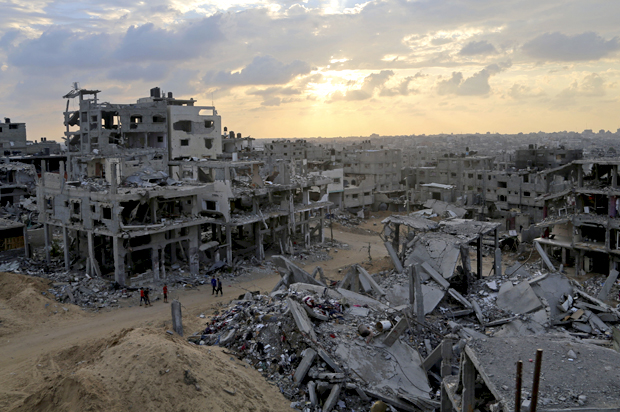Almost 18 months after Israel’s summer 2014 war in Gaza, reconstruction or repair of the homes of 74 percent of Palestinian families who were displaced has not even begun, according to a report by the U.N. Office for the Coordination of Humanitarian Affairs, or OCHA.
“The impact of the 2014 Gaza-Israel hostilities continues into 2016,” notes OCHA’s latest humanitarian bulletin on the occupied Palestinian territories.
Just 15 percent of Gazan families that were displaced in the war have been able to return to their repaired or reconstructed homes.
More than 16,000 families, amounting to approximately 90,000 people, remain displaced or homeless.
Roughly 160,000 of the homes that were damaged have been repaired, but hundreds of thousands more remain.
“The humanitarian situation in Gaza remains perilous,” warned U.N. Secretary-General Ban Ki-moon in his January Security Council briefing.
“Security measures alone will not stop the violence. They cannot address the profound sense of alienation and despair driving some Palestinians — especially young people,” Ban added, addressing the wave of deaths and injuries in recent months.
More than 2,250 Palestinians were killed in the 51-day war in July and August 2014, according to the U.N., approximately two-thirds of whom were civilians, including more than 550 children. On the other side, 66 Israeli soldiers were killed, along with six civilians. 92 percent of those killed by Palestinian militants were soldiers.
Numerous human rights organizations, including Amnesty International, accused the U.S.-backed Israeli military of intentionally targeting civilian areas and engaging in war crimes.
Moreover, for close to a decade, the Israeli government has imposed a blockade on Gaza that U.N. experts have for years said is illegal.
Because of Israel’s blockade and periodic wars, the U.N. has warned that Gaza will be “uninhabitable” by 2020.
“Palestinian frustration is growing under the weight of a half century of occupation and the paralysis of the peace process,” the U.N. secretary-general remarked to the Security Council. “Facts on the ground in the occupied West Bank are steadily chipping away the viability of a Palestinian state and the ability of Palestinian people to live in dignity.”
Since 1967, Palestinians have lived under illegal Israeli military occupation. Violence and repression is an everyday reality for Palestinians living under occupation, but in recent months, in particular, it has escalated.
From October to the end of December, roughly 14,000 Palestinians were injured in suppression of protests or in raids by Israeli occupation forces, according to OCHA.
In the past four months, close to 170 Palestinians have been killed by Israeli occupation forces or illegal settlers. 27 Israelis have been killed as well. The majority of attacks by Palestinians were carried out against Israeli occupation forces in the illegally occupied territories.
In January, 18 Palestinians were killed and 582 were injured, while two Israelis were killed and 16 were injured, according to the latest OCHA humanitarian bulletin.
The U.N. agency furthermore indicates that 85 Palestinian structures were demolished by Israel in the occupied West Bank, and 108 people were displaced in January. Some of the properties targeted by the Israeli government included humanitarian assistance provided by the international community to Palestinian Bedouin communities, who OCHA says are at risk of being forcibly removed from their lands by Israel.
Since October, Israeli occupation forces have also created at least 91 new obstacles — including checkpoints, roadblocks, earth mounds and more — on roads in the occupied West Bank in order to restrict Palestinian vehicular movement. The U.N. agency says these barriers impede access to services and undermine economic activity, directly impacting at least 850,000 Palestinians.
OCHA draws attention to “a sharp rise” in the number of Palestinian children detained by Israeli occupation forces. At the end of last year, 428 Palestinian children were detained in the Israeli prison system This is the highest number since March 2009. At least six teenagers were imprisoned without charge or trial.
The report expresses concerns over the conditions of detained Palestinian children, and raises allegations of abuse. Humanitarian group Defense for Children International-Palestine interviewed hundreds of Palestinian children over a three-year period and found that three-quarters had suffered some form of physical violence while under arrest by Israeli authorities.

